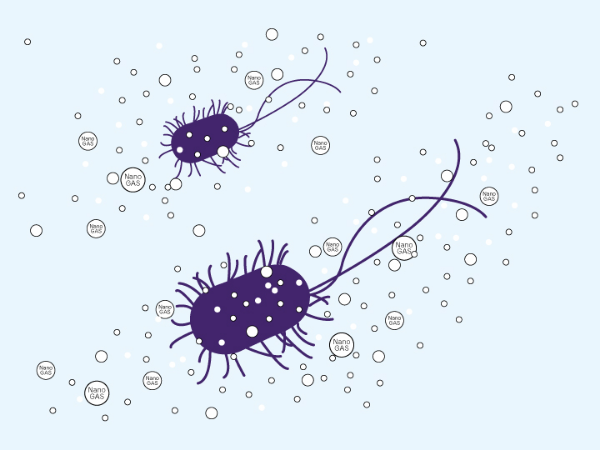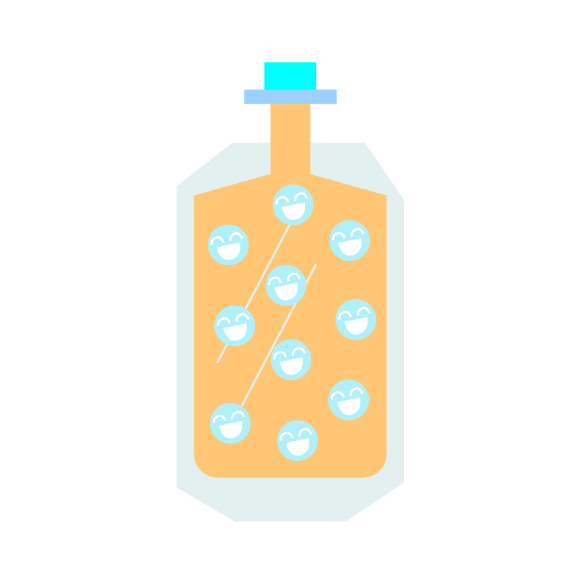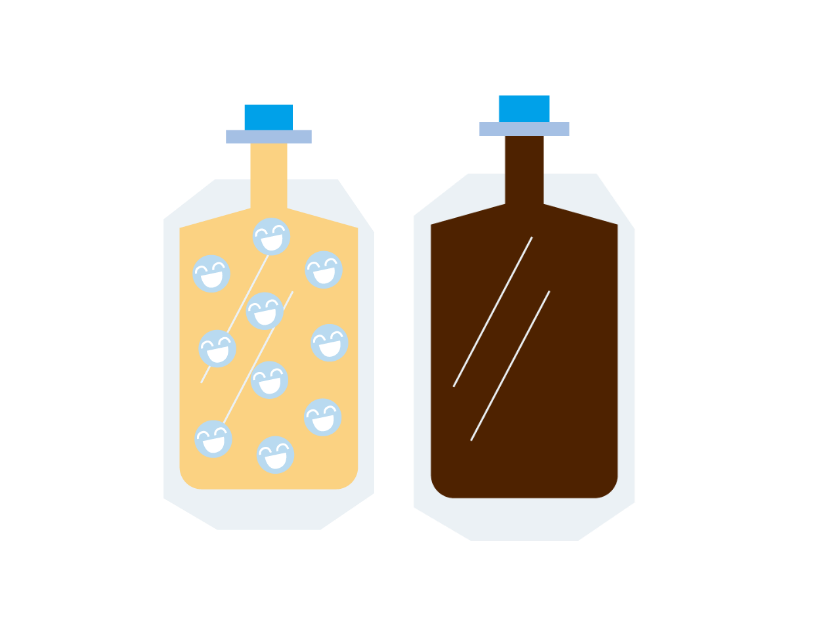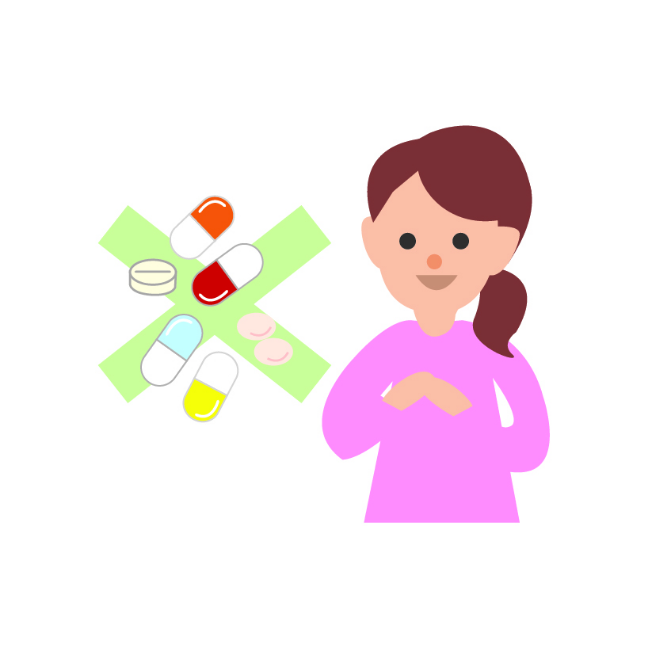- Application of our proprietary nanobubble technology to FMT improves the efficiency of bacteria settlement in the intestinal tract.
- Stable use of cryopreserved donor stools centrally managed in Japan's first donor bank dedicated to FMT.
- Select multiple donors by disease and condition and design individual transplant plans.
- Shortening the time of establishment by using a gradient concentration of transplanting solution and multiple planned transplants.
- Simplicity with no antibiotics or other drugs and less burden on both the patient and the bacteria
- No pre-treatment, diet, or other restrictions due to the rubber intestinal catheter intubation method without a colonoscope.
- High reproducibility is achieved by our proprietary automatic bacterial solution conditioner, which adjusts the bacterial solution in an environment similar to that of the intestinal tract.
Commonly performed fecal microbiota transplantation has the disadvantages of large doses of antibiotics, which adversely affect the patient's flora balance, and saline solution as a solvent, which reduces the fixation efficiency of donor bacteria.
On the other hand, NanoGAS®-FMT uses controlled stools from donors belonging to a donor bank, allowing flexible concentration adjustment. It uses a soft rubber catheter for intubation and does not require prior antibiotic administration or pre-treatment for colonoscopy. The use of "NanoGAS® water," a proprietary product, as a solvent for the bacterial solution for transplantation, can increase the fixation effect by several orders of magnitude.
Comparison with other methods
| Our proprietary Shinbiosis (FMT Method) protocols |
Common FMT methods practiced in Japan and abroad (Amsterdam Protocol compliant) |
|
| Solvent characteristics | NanoGAS® Water developed by Shinbiosis |
Saline, 5% glycerol, etc. |
| Means of adjustment | Currently manual Automatic bacteria solution from next year |
Currently manual No plans to automate |
| Donors | In-house donor bank Japanbiome |
Domestic: "relatives up to the second degree of kinship." Overseas: stool bank |
| Number of transplants | Based on 3 to 6 times with concentration gradient Additions as needed |
In principle, one time for investigational diseases The number of times varies widely depending on the disease |
| Stool storage | Frozen stools below 80°C | Domestic stools within 2 hours of collection Overseas: frozen at -80℃ or below |
| Bacterial solution concentration | 1:10 to 1:45 Adjusted with NanoGAS® water |
About 1:5 Adjustment with saline solution |
| Dosing method | Intravenous method with rubber intestinal catheter | Colonoscopy, duodenoscopy Oral administration by capsule (overseas) |
| Other | No pre- or post-procedure Almost no invasiveness |
Dietary restrictions, antibiotic administration, bowel cleansing High patient burden |
*Patent pending for fecal microbiota transplantation technology.
Characteristics of NanoGAS® water
Negative charge
Nanobubbles have the property of being negatively charged, which means that bubbles repel each other and do not combine. Therefore, they attract and adsorb organic dirt that is positively charged. Since the size of the bubbles is very small, they can be expected to have a cross-linking effect, penetrating into the underside of dirt and lifting it off the surface. This is also called the surfactant effect.
In fecal microbiota transplantation, the surface effect removes organic dirt from the intestinal wall and induces bacteria into the mucus layer of the intestinal tract without damaging the flagella and cilia of the transplanted gut microbiota.

Extended preservation of bacterial solution quality
Because the bubbles in NanoGAS® water are extremely small, they are not buoyant.
Therefore, the bubbles remain in the liquid for a long period of time without disappearing.
In fecal microbiota transplantation, NanoGAS® water is expected to exhibit preservation performance equivalent to freezing, preventing bacteria from contacting each other and distorting the state of the bacterial fluid to an unintended balance before transplantation.
An effective method of preparing bacterial solution for transplantation
The unique feature of the bacteria solution for transplantation in NanoGAS®-FMT is the use of NanoGAS® water for dissolving stools. Nanobubbles are widely used in industrial fields, and NanoGAS® water opens up various applications because it has far more bubbles than ordinary nanobubbles. It is also stable and transportable for long periods of time. NanoGAS® water effectively settles other people’s gut microbiota in patients’ intestines and prevents autoimmune functions such as IgA (immunoglobulin A) from blocking the bacteria.
Donor selection

Fecal microbiota transplantation is currently undergoing clinical trials in Japan, where healthy relatives within a second degree of kinship are often used as donors to alleviate any psychological resistance to transplanting bacteria solution purified from stool. On the other hand, in the United States and the United Kingdom, stool banks have been established and fecal microbiota transplants are performed using stools from healthy third parties.
We believe that the balance of diverse gut microbiota is important and that fecal microbiota transplantation is more effective when using a third-party donor with different genetics and a different living environment. For this reason, NanoGAS®-FMT receives stool samples from Japanbiome, a donor bank affiliated with Shinbiosis, which registers only donors who have regularly passed blood tests, stool tests, and a rigorous interview with over 150 items, including lifestyle management details. We receive stools from Japanbiome, a donor bank affiliated with Shinbiosis Corporation
Transplantation methods

Number and frequency of transplants
Currently, the only disease for which fecal microbiota transplantation is officially approved by the government in the U.S. is CDI (Clostridium difficile infection). For CDI, clinical trials are basically conducted with only one transplant.
Other diseases such as ulcerative colitis (e.g., 40 transplants) and autism spectrum disorder (e.g., once a week for 8 weeks) have different protocols and trials are being conducted.
In NanoGAS®-FMT, the number of transplants does not vary greatly depending on the disease. Rather, based on the belief that age and years of disease are closely related to the outcome, the attending physician and patient decide whether additional transplants are necessary based on 3~6 transplants.

Method of stool storage
In many clinical trials in Japan, fresh stools from pre-tested donors are used on the day of collection; however, NanoGAS®-FMT does not use fresh stools that have not been tested and whose safety is not guaranteed. Moreover, there was a concern that the method of using fresh stool would not be able to deliver transplants to a large number of people.
Only after the health of the donor and the safety of the feces have been sufficiently confirmed, frozen preserved stools are used. We use frozen stools with safety as our first priority. We do not add cryoprotectant (glycerol), which is also used in enema solutions, because the effects of additives on the human body and bacteria are not known.

Concentration of bacterial solution
The concentration of the bacteria solution in foreign papers is generally 1:5, but this concentration may be too concentrated.
In NanoGAS®-FMT, the bacterial solution is adjusted to about 1:10 to 1:45 through the surfactant action of nanobubble technology.

Dosing method
Conventional methods include oral capsules and colonoscopy. However, oral capsules are large and require the use of stomach acid suppressants to prevent loss in stomach acid. Furthermore, colonoscopies require dietary restrictions and laxatives, both of which are physically and mentally painful.
NanoGAS®-FMT is implanted with a soft rubber catheter that allows the bacteria to be fully delivered into the intestinal tract with little physical or emotional distress to the patient.

Pre-treatment or no pre-treatment
Many other clinical trials and clinical applications involve the use of gastric acid suppressants and bowel cleansing agents, as well as dietary restrictions prior to transplantation. The most common method is to take antibiotics for a certain period of time and dare to once impair the diversity of intestinal flora before transplantation.
With NanoGAS®-FMT, there is no such pre-treatment at all.





